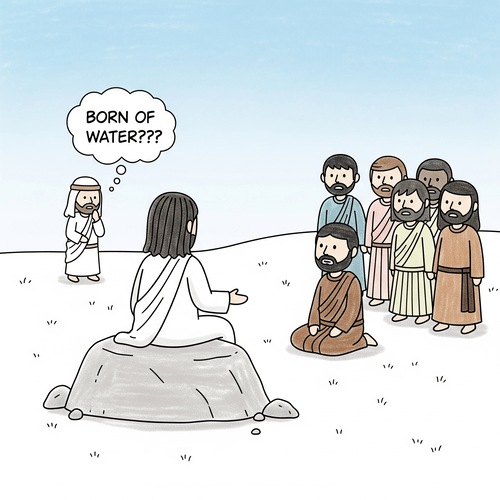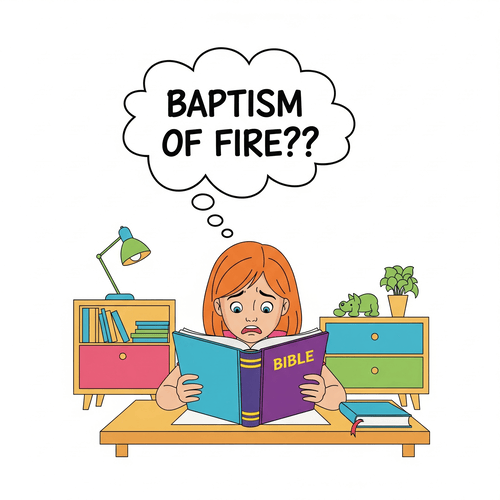Is Annihilationism A Distortion of Bible Truth?
What if everything you believed about hell was designed to make you comfortable with sin?
Annihilationism—the belief that the unrighteous are ultimately destroyed and cease to exist rather than enduring eternal conscious punishment—has gained significant traction in evangelical circles. Proponents argue a loving God wouldn’t torment people forever, and that annihilation better reflects divine justice.
The historic Reformed position, however, maintains Scripture’s clear teaching—eternal conscious punishment for the unrepentant. This doctrine, while difficult, has been the consistent testimony of Scripture and of orthodox Christianity for two millennia.
Thesis: While annihilationism may seem more palatable to modern sensibilities, it represents a dangerous distortion of Bible truth. It undermines both God’s perfect justice and the gospel’s urgent call to repentance.
WHY PEOPLE PREFER ANNIHILATIONISM
The appeal of annihilationism is understandable. In our therapeutic culture, the idea of eternal conscious torment strikes many as excessive, even barbaric. Several factors drive people toward this position:
- Emotional Appeal: The thought of loved ones suffering forever creates genuine anguish. Annihilationism offers emotional relief by promising that suffering, however intense, will eventually end.
- Philosophical Objections: Many struggle to reconcile eternal punishment with God’s love and justice. If punishment should fit the crime, they argue, how can finite sins warrant infinite consequences?
- Cultural Pressure: In an increasingly secular society, the traditional doctrine of hell is seen as primitive and cruel. Annihilationism allows Christians to maintain belief in final judgement while appearing more reasonable to skeptics.
- Selective Exegesis: Annihilationists point to biblical language of “destruction,” “perishing,” and “death” to support their view, arguing these terms naturally suggest cessation of existence.
Yet good intentions don’t guarantee sound theology. The question isn’t what we’d prefer to be true, but what Scripture actually teaches.
THE BIBLICAL CASE FOR ETERNAL CONSCIOUS PUNISHMENT
The doctrine of eternal conscious punishment rests on substantial biblical evidence that annihilationists struggle to explain away:
- Christ’s Clear Teaching: Jesus spoke more about hell than heaven, consistently describing it in terms of ongoing conscious experience. In Mark 9:47-48, He warns of hell “where their worm does not die and the fire is not quenched”—language indicating perpetual, not temporary, punishment. The parable of the rich man and Lazarus (Luke 16:19-31) depicts the rich man in conscious torment, able to speak, reason, and suffer.
- The Language of Eternity: Matthew 25:46 explicitly contrasts “eternal punishment” with “eternal life.” The same Greek word (aionios) describes both destinies. If eternal life means everlasting conscious existence with God, eternal punishment must mean everlasting conscious separation from God.
- Degrees of Punishment: Scripture teaches punishment will vary according to the severity of one’s sins (Luke 12:47-48, Revelation 20:12-13). This concept only makes sense if punishment involves ongoing conscious experience where degrees can be meaningfully applied.
- The Nature of the Second Death: Revelation 20:14-15 describes the “second death” as being thrown into the lake of fire. Yet this same passage shows the beast and false prophet, thrown into the lake of fire 1,000 years earlier, still being tormented “day and night forever and ever” (Revelation 20:10). They weren’t annihilated—they continued in conscious torment.
- The Resurrection of the Unjust: Acts 24:15 speaks of a resurrection “of both the just and the unjust.” Why would God resurrect bodies destined for immediate annihilation? The resurrection of the wicked only makes sense if they’re to experience conscious, embodied punishment.
WHY IS ANNIHILATIONISM A DISTORTION OF BIBLE TRUTH?
There are compelling reasons to view annihilationism as fundamentally deceptive—and as a lie from hell:
It Diminishes God’s Holiness: Annihilationism implicitly argues that sin against an infinitely holy God doesn’t warrant infinite punishment. This reduces God’s holiness to human standards and fails to grasp the magnitude of rebellion against our Creator.
It Undermines Gospel Urgency: If unbelievers simply cease to exist, the motivation for evangelism diminishes. Why the desperate urgency in Paul’s ministry if the lost face only temporary punishment followed by peaceful non-existence? The gospel’s power lies partly in rescuing people from something truly terrible.
It Compromises Divine Justice: God’s justice demands that sin be punished proportionally. Since sinners continue to rebel against God even in hell (Revelation 16:9,11), their punishment continues. Perfect justice requires ongoing punishment for ongoing rebellion.
It Mirrors Satan’s Original Lie: In the Garden, Satan told Eve, “You will not surely die” (Genesis 3:4). Annihilationism echoes this deception by suggesting spiritual death isn’t as final or terrible as God warned. It minimises the consequences of sin just as Satan did.
It Reflects Human Pride: Ultimately, annihilationism often stems from the proud assumption that we can judge what’s “fair” for God to do. It places human moral intuitions above divine revelation, the same error that led to humanity’s fall.
It Ignores the Pattern of Scripture: Throughout the Bible, God’s judgements are often more severe than people expect. From the flood to Sodom and Gomorrah to the exile, God consistently shows sin’s consequences exceed what folks anticipate. Annihilationism reverses this pattern, making hell less severe than Scripture indicates.
CONCLUSION: ANNIHILATIONISM A DISTORTION OF BIBLE TRUTH
The doctrine of eternal conscious punishment is undeniably difficult. It challenges our comfort zones and forces us to grapple with the reality of God’s perfect holiness and justice. Yet difficulty doesn’t equal error.
Annihilationism, while emotionally appealing, fails to account for the full testimony of Scripture. More dangerously, it diminishes both the seriousness of sin and the wonder of salvation. When we minimise hell, we inevitably minimise the cross.
The reality of eternal conscious punishment should drive us to our knees in gratitude for the gospel and to our feet in urgent evangelism. If hell is real—and Scripture overwhelmingly testifies it is—then nothing matters more than ensuring people hear the good news of salvation through Christ alone.
ANNIHILATIONISM A DISTORTION OF BIBLE TRUTH: RELATED FAQs
What do leading Reformed scholars today say about annihilationism? Contemporary Reformed theologians like John Piper and Robert Peterson have written extensively defending eternal conscious punishment. Piper argues those who find infinite punishment “abhorrent” possess a “small” view of God, while Peterson’s scholarly work Hell on Trial systematically refutes annihilationist arguments through careful biblical exegesis. The Gospel Coalition maintains annihilationism is “inconsistent with the biblical portrait of hell”, representing the broader Reformed consensus.
- How do annihilationists handle the problem of justice for varying degrees of sin? This presents a significant challenge for annihilationism. If Hitler and a “morally decent” unbeliever both face identical annihilation, how does this reflect proportional justice? Traditional Reformed theology teaches hell involves degrees of punishment corresponding to degrees of guilt (Luke 12:47-48), which requires ongoing conscious experience. Annihilationism can only offer degrees of suffering before extinction—which seems inadequate for achieving true justice.
- What about the argument that immortality is conditional rather than inherent to all humans? Some annihilationists argue only believers receive immortality, while the wicked simply cease to exist. However, this overlooks the biblical teaching about the resurrection of both the just and unjust (Acts 24:15). If the wicked are raised with bodies, this suggests they receive some form of immortality—but for judgement rather than blessing. The question isn’t whether people are naturally immortal, but whether God grants resurrection life to all for their eternal destinies.
- How does annihilationism affect missionary urgency and evangelistic motivation? While annihilationists claim their view still motivates evangelism, the practical impact is undeniably different. If unbelievers face temporary punishment followed by peaceful non-existence, the stakes are significantly lower than eternal conscious torment. This may explain why historically, periods of strong missionary advance have coincided with robust belief in eternal punishment. The gospel’s power partly lies in rescuing people from something truly terrible—not merely from temporary discomfort.
Are there any biblical texts that clearly support conscious eternal punishment over annihilation? Revelation 14:11 states the smoke of the torment of the wicked “goes up forever and ever, and they have no rest, day or night.” The phrase “no rest, day or night” requires conscious experience—the dead cannot lack rest. Similarly, Revelation 20:10 shows the beast and false prophet still being tormented after 1,000 years in the lake of fire. These passages use language of ongoing conscious experience that’s difficult to reconcile with eventual annihilation.
ANNIHILATIONISM A DISTORTION OF BIBLE TRUTH: OUR RELATED POSTS
Editor's Pick

The Gap Theory Exposed: Why Embrace a Young Earth?
The Gap Theory proposes there’s a vast time gap—millions or billions of years—between Genesis 1:1 (“In the beginning God created [...]

Rethinking Sickle Cell Anaemia: A Case for Intelligent Design
Sickle cell anaemia presents what many consider evolution’s strongest card—a genetic condition that causes suffering yet provides protection against malaria. [...]

‘Bad’ Design: Flaw in Nature Or Flaw in Our Perspective?
When the Eiffel Tower was first proposed, critics called it a monstrous eyesore that would ruin Paris forever. Today, it’s [...]

The Problem of Divine Absence: How Do Believers Cope?
WHEN GOD SEEMS FAR: THE GREAT DISCONNECT Ever wondered why God seemed so close to Joseph in his Egyptian prison, [...]

Is ‘Gay Christian’ a Biblically Acceptable Identity to Have?
THE QUESTION OF IDENTITY IN BIBLICAL PERSPECTIVE The term “gay Christian” has become increasingly common in contemporary religious discourse, representing [...]

What Does ‘Born of Water’ in John 3:5 Mean?
THE REFORMED VIEW VS OTHER INTERPRETATIONS ”Jesus answered, ‘Truly, truly, I say to you, unless one is born of water [...]

The Lordship Salvation Controversy: What’s It All About?
Can someone be truly saved without making Jesus Christ their Lord? The question sits at the heart of one of [...]

1 John 5:6: How Do Water and Blood Reveal Jesus’ True Identity?
"This is he who came by water and blood—Jesus Christ; not by the water only but by the water and [...]

Is Jesus Yahweh? Answering Unitarian Objections
The question of whether Jesus Christ is truly God has divided Christians for centuries. While orthodox Christianity has consistently affirmed [...]

Matthew 3:11: What Is the Baptism of Fire?
When John the Baptist declared, “He will baptise you with the Holy Spirit and fire” (Matthew 3:11), his words carried [...]
SUPPORT US:
Feel the Holy Spirit's gentle nudge to partner with us?
Donate Online:
Account Name: TRUTHS TO DIE FOR FOUNDATION
Account Number: 10243565459
Bank IFSC: IDFB0043391
Bank Name: IDFC FIRST BANK






